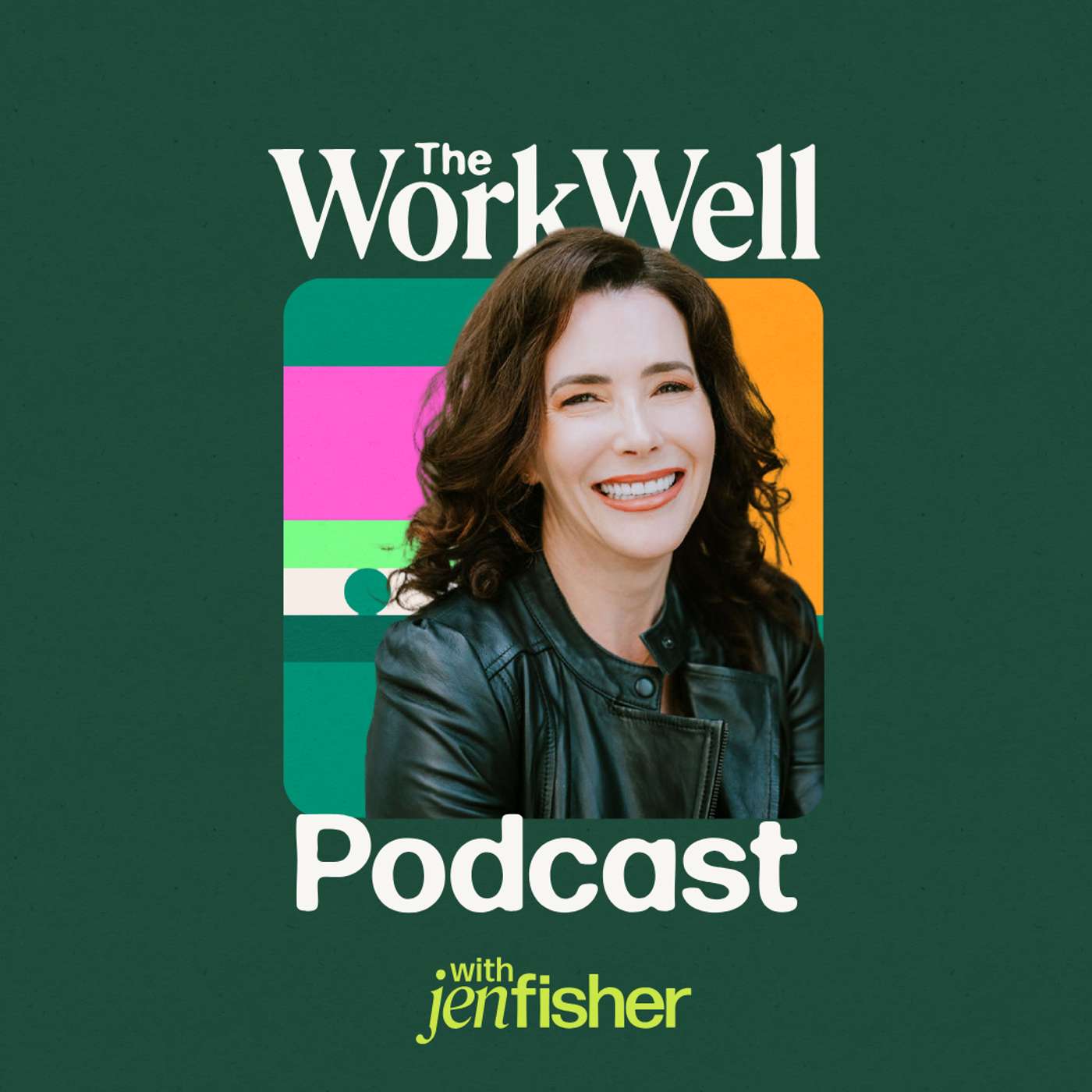
The Balanced Badass Podcast®
The Balanced Badass Podcast® is the show for high-achieving professionals who want to prevent burnout, master work-life balance, and stay badass without losing their sanity.
Each episode, we’re not just tackling your overflowing calendar and keeping your household on track; we’re getting into burnout prevention and recovery strategies so that you have time to breathe, laugh, and savor that much-needed glass of wine at the end of the day.
Think of this podcast as your regular dose of practical advice, a touch of humor, and a little tough love, like catching up with a friend who just gets it. Whether you’re navigating burnout, balancing meetings and meal prep, or carving out moments of self-care, this is the space where we figure it out together.
Disclaimer: My content is for educational purposes only and not a substitute for professional medical or mental health advice. For serious concerns, please consult a qualified provider.
The Balanced Badass Podcast®
Is Your Work Persona the Real You?
In this episode, we're getting into the exhausting performance of the work persona that many of us feel compelled to maintain. Tara shares a heartfelt message about the cost of constantly performing professionalism at the expense of our authentic selves.
Learn how this persistent act can lead to burnout, emotional disconnection, and a loss of self-identity. Discover practical steps to start reclaiming your true self at work and beyond. From breaking performance triggers to making small shifts towards authenticity, get ready to acknowledge and challenge the behavioral armor you've built to survive in corporate environments.
Perfect for high achievers tired of playing a role that no longer fits and eager to lead more authentically.
Check out the detailed show notes (https://tarakermiet.com/podcast/) and leave your thoughts or questions about today's topic.
00:00 Introduction and Personal Struggles
00:50 The Monday Morning Scenario
02:58 The Work Persona Unveiled
05:39 Origins of the Work Persona
09:16 The Cost of the Work Persona
15:21 Steps to Reclaim Authenticity
16:31 Practical Tips for Small Shifts
19:37 Conclusion and Call to Action
Got something to say? Text me!
-----
I’m Tara Kermiet, a leadership coach, burnout strategist, and host of The Balanced Badass Podcast®. I help high-achievers and corporate leaders design careers that are successful and sustainable.
Here, you’ll find tactical tools, leadership lessons, and burnout education that just makes sense.
👉 Start by taking my free Burnout Drivers Mini Assessment
😍 Join my community on Instagram (@TaraKermiet) and/or TikTok (@TaraKermiet) so we can stay connected!
🎤 Got a question, a topic you want me to cover, or just want to share your thoughts? I'd love to hear from you! Send me a DM or email.
Stay balanced, stay badass, and make good choices!
Disclaimer: My content is for educational purposes only and not a substitute for professional medical or mental health advice. For serious concerns, please consult a qualified provider.
[00:00:00] All right, friend. I need to be transparent and just let you know that today I am fighting a pretty major migraine. And if you know me personally, you know that I struggle with migraines pretty consistently, and this one has knocked me for a loop. But I did not want to miss recording today's episode because one, it's.
Coming from the heart and to, I think it's something that many of us may need to hear and may need to listen to. So we are chugging through and just appreciate your grace and understanding. As I am looking a little rough, for those of you that are listening on YouTube and, um, may even sound a little rough for those of you listening on the other podcast platforms.
But anyways, let's get started. So. Imagine that it is Monday morning and you've had maybe three hours of decent sleep because your brain decided at [00:01:00] 2:14 AM that that was the perfect time to replay that awkward comment you made in a meeting. Hmm, six months ago. Your inbox probably looks like it's been hit by a tornado.
You've got emails from Friday that you didn't respond to. New requests from people who apparently think your entire job is just making their lives easier, and that one passive aggressive follow-up marked high priority, even though it's definitely not. And then you've got that one-on-one with your boss in 20 minutes, and you don't feel okay at all.
Your chest is tight, your stomach's and knots, your brain is foggy, but also somehow moving a thousand miles an hour at the same time. But what do you do? So you throw on your, I've got it together voice. You slap a polite smile on your face. You sit up straight in your chair. You check the lighting on your Zoom camera, and you jump into character like a freaking Broadway understudy who's about to go on stage for the role she didn't even audition for.
[00:02:00] And you nail the performance. Of course, you always nail the performance. You answer every question like you've got a fully mapped out plan. Even though you are making it up as you go, you laugh in the right spots, you nod thoughtfully. You say great point. Even when it's not a great point, you reassure. You manage up.
you filter every damn word through the how will this be perceived translator that's constantly running in your brain. Then the call ends and you're wiped like soul, deep, exhausted. This is the kind of tired where even sitting upright feels like work.
The kind of tired where your eyes are open, but you are not there and you didn't even do anything that intense. It's not like you were carrying boxes, you weren't in a courtroom defending someone's life. You just acted. Okay, so what the hell is that? Well, let me tell you what it [00:03:00] is. That's your work persona in action, that highly skilled, tightly rehearsed, carefully filtered version of you that knows how to be agreeable, but not too soft.
Confident but not arrogant, capable, but not threatening, efficient, but never unavailable and warm, but never too emotional. It is like being trapped in a performance of professionalism. The musical and the show never ends, no intermission, no understudies, no backstage crew, just you keeping it all together while slowly burning out behind the scenes, and it is quietly costing you more than you realize because that persona doesn't clock out when you do it follows you home.
It shows up in how you text your friends LOL. I'm fine. When you're clearly not, it leaks into your weekends. When you overthink a message before hitting send, it shapes how you [00:04:00] show up in your relationships because you're so used to being who people want you to be, that you've forgotten who you actually are.
It's costing you clarity. It's costing you rest, and it's costing you the ability to feel seen, not just for what you do, but for who you are. And look, I am not judging. I've lived this, I've done this performance in multiple jobs across industries. Hell, I used to win awards for it. I was the calm one, the reliable one, the one who always knew what to say.
But guess what? That version of me. She also had a secret stash of migraine meds in her desk drawer. Yes, surprise, surprise. She also cried before work more times than I want to admit, and she was physically ill before high stakes meetings, and not one person ever asked if I was okay because I was so damn good at performing, being okay.[00:05:00]
So when I say it's costing you more than you realize, I don't mean just time or energy. I mean identity, I mean your connection to your actual self. I mean, your ability to live a life that feels like yours and not some curated corporate branded version of it. That's the real tool. And if that made you exhale a little harder than usual, stick with me, my friend, because you are not broken.
You're not dramatic. You are just tired of playing a role that no longer fits. And that is the beginning of something way better. So let's talk about what this thing really is. So we've named it already the work persona, but let's go deeper than just the version of you that shows up at work, because this isn't just about office etiquette or knowing when not to overshare in a team meeting.
This goes all the way back to the messaging we've absorbed about who we're supposed to be in order to be seen as competent, respected, [00:06:00] promotable, and safe. Your work persona is the behavioral armor that you've built in response to one very human fear. The fear that if I show people who I really am, it won't be good enough.
And maybe you didn't start your career thinking that way consciously, but it's there. It shows up in the way you monitor your tone when giving feedback. Or how you soften your ideas with just a thought or feel free to disregard or how you say yes to one more project because saying no feels like a threat to your entire identity as someone who's dependable, valuable, worth keeping around.
If that hits home, make sure you listen to last week's episode 'cause we talk a lot about that, but this is not something that you built overnight. It is more like a layered costume that started in childhood and got upgraded every time you were rewarded for being polished, polite, and high achieving, and for hiding anything that made you seem too human.
So let's take it back. When you [00:07:00] were younger, maybe in school, maybe at home, you probably learned that being high performing came with praise. You got gold stars, whether literal or metaphorical, for following rules for doing well, being pleasant, being impressive, and you also probably learned that other behaviors being messy, emotional, loud, angry, confused, opinionated, I could go on.
Those all came with consequences. You got weird looks, you got labeled. Dramatic, aggressive, difficult. Disruptive. So what did you do? You adapted because you're smart, you're intuitive, and you're high functioning as hell. You trimmed the edges off your personality. You learn to read the room.
You got really good at self-monitoring, and you stopped raising your hand. If the question was too risky, you stopped disagreeing out loud, unless you could phrase it like a compliment. Sandwich [00:08:00] wrapped in 17 disclaimers. And then you got into the workforce, and guess what? That adaptive behavior worked.
You got good feedback, you got hired, you got promoted. People said you were a great culture fit, which let's be real usually means that you made yourself comfortable to be around. But what started as self-protection slowly calcify into your default? You stop noticing where the performance ends and the person begins, and now you're years into a career and realizing that the version of you people see at work is curated, cautious, and emotionally edited.
You don't raise your voice even when you should. You don't bring your full ideas to the table, just the ones that you know will land. You don't take big swings because you are afraid of being seen as too much or not strategic enough. And you're so used to it, you might not even know what your real leadership voice [00:09:00] sounds like anymore.
You're not actually faking it, but you are filtering it. And that filter has a cost because every time you mute yourself, you're signaling to your nervous system that it's not safe to fully be me here. And when your nervous system hears that enough times, it just stops trying. It trades, authenticity for approval, expression for efficiency, creativity for safety.
And over time you don't just feel tired, you feel hollow. And I know that sounds dramatic, but listen, I have coached high achieving, high performing successful on paper leaders who are secretly wondering what's wrong with me. I have everything I wanted, but I feel disconnected. I feel like I'm performing all the time.
That's not a personal failure. That's not a lack of gratitude. That's not being too sensitive. That's the natural result of years spent shaping yourself to fit into [00:10:00] systems that were never built, to hold your full humanity systems that define professionalism in ways that reward conformity and punish authenticity.
E systems that were never designed with people like you in mind, especially if you're someone who doesn't fit the old school leadership mold. White male, neurotypical, emotionally detached, straight able bodied, and let's not pretend that mold is extinct. It's just gotten better at wearing Patagonia and calling itself people first.
So yeah, your work persona was necessary. It got you through some hard shit. But if you're here listening to this, I'm willing to bet that version of you is getting really heavy to carry. And the longer you wear it, the more people expect it from you. They come to rely on the version of you who never rocks the boat.
And then when you do start to peel it back, even just a little, it feels risky, like you're breaking an unspoken contract. But what if that contract was never fair to begin with? [00:11:00] What if being professional doesn't have to mean being disconnected? What if you could lead, speak, create, and show up as the real you without burning out or blowing up your whole career?
Let's sit with that question for a second. What if the version of professional that you've been performing isn't actually required? What if it's just what you learned was necessary because of the rooms you were in, the bosses you worked under, the feedback you got early in your career that stuck with you, like emotional duct tape?
What if you were never actually too much? Just too different for someone else's comfort because this polished, competent, non-threatening version of you is not just something you wear at work. It bleeds into everything into how you lead your team, into how you mentor people, coming up behind you, into how you show up in your friendships and to how you talk to yourself when no [00:12:00] one else is around you.
Start rehearsing your own emotions before you even feel them. You start saying, I'm fine. Before you even actually check in with yourself, you start planning for how to make everyone else comfortable without ever asking, what do I actually need right now? Because when the performance becomes muscle memory, your nervous system doesn't go into survival mode at work.
It starts living there. And I need you to know that this is not some character flaw. This is a trauma response really that looks like a personality, and it's wildly common among high achievers, especially those in people focused roles, because your whole value system is built around care impact and being seen as competent.
And when your work persona has been keeping that image in tact for years, well, it's hard to imagine who you'd be without it. [00:13:00] So let's explore that because this is the question that gets people in my coaching sessions to freeze up every single time. If I'm not this version of myself, then who the hell am I not the role, not the resume, not the five star performance review, not the always on, emotionally neutral, over-functioning superhero that you are, but you.
The person under the polish, what do you actually value? What do you need to feel safe, creative, lit up again? How would you lead, speak, decide, or delegate if you weren't filtering everything through what will make me look good or keep me safe? Most of us never learned how to show up as ourselves in systems that rewarded us for being someone else.
And that means most of us have no idea what authentic [00:14:00] leadership actually looks like, because we've never seen it modeled in a way that didn't end in burnout, backlash, or being iced out of the room. So we keep playing it safe. We keep editing our opinions, staying two steps ahead of our own emotions and nodding along even when something feels off, because rocking that boat feels like a bigger threat than sinking silently.
And again, I get it. You are not wrong for protecting yourself. You're not wrong for choosing safety. You are playing the game with the rules you were given. But now you get to ask a different question, do these rules actually work for me anymore? Because the truth is, if you're feeling disconnected, resentful, exhausted, or low key ragy, every time someone tells you that you're such a good team player, you're probably not thriving.
My guess is that you're coping. And coping isn't the same as leading performing professionalism isn't the same as [00:15:00] being in your power. So let's say you're sitting there thinking, okay, I'm living through a version of myself that's been curated for survival. I get it, but how do I even begin to connect with the real me underneath all this performance crap?
I am not gonna tell you to journal about your feelings and take a salt bath. I mean, you can, but this is bigger than self-care. This is self reclamation and it starts with noticing. So here's your first step. Start tracking your performance triggers. Noticing when your work persona kicks in is the beginning of changing the damn pattern.
So for the next few days, I just want you to pay attention to the moments when something shifts inside you at work. You know the feeling when your voice changes or maybe your tone flattens out, or you immediately go into, let me manage everyone's emotion mode. What's happening in those moments? Pay attention to who's in the room.
What are you [00:16:00] feeling that you're not expressing, and what are you afraid might happen if you showed up a little more real? You don't need to change your behavior right away, but you do need to clock it. Because this is data and it's powerful. Now, once you've started seeing the pattern, you can start making some small shifts.
I'm not talking about a full on personality rebrand because we're not trying to get you fired here. We are trying to get you free. So here are a few tangible things you can try. First, you can say the honest thing just a little earlier than you normally would. So that might mean admitting that you actually need some time to think about something instead of immediately responding with a polished answer.
It also might mean saying, I'm not sure I agree, instead of staying quiet and stewing about it for two days. It's not about being confrontational, but I do want you to be clear. Number two is to pause before you default to yes High [00:17:00] performers, especially the ones stuck in a work persona, are chronic overcom committers.
So next time someone asks you to do something, practice saying, let me take a look and get back to you. That line is simple, but it buys you time. It creates some space, and it sends a message to your brain that your bandwidth does matter. Third, bring one real emotion into a professional space. I'm not telling you that you have to cry on a zoom call or trauma dump during a one-on-one, but you can say something like, honestly, I'm feeling kind of off today, but I'm here, or, that feedback landed a little harder than I expected. Can I take some time to sit with it and come back to you?
That's real, but it's still professional and it doesn't require you to throw your whole mask out the window right away. And fourth, choose one situation this week to be just 5% more yourself. I'm not asking for a hundred percent. I'm not asking for a full on reveal, just [00:18:00] a 5% increment.
That could mean speaking with your natural tone instead of your work voice. It can mean showing a little more personality in a Slack message. It can mean sharing your actual idea in a meeting instead of the one that feels safest. This is kind of like exposure therapy for authenticity, and it works. Now, I'm not pretending this is gonna be easy, especially if you've been in performance mode for years.
This is nervous system level stuff, and that means that you'll probably feel uncomfortable even if the shift is tiny. You might feel guilty, you'll probably feel anxious, and you might hear that little voice in your head screaming. That was too much. That's okay. That voice is just your old survival system talking.
You can acknowledge her, thank her for her service, and then remind her that we're safe. Now we're doing something different. It's not about going full mask off tomorrow. It's about [00:19:00] reclaiming your power and micro moments over and over again until being real feels safer than being performative, until your default setting becomes authentic instead of accommodating.
And it starts with small, messy, real ass steps. So try one this week, just one friend, and if you do DM me, email me, shout into the void, whatever that looks like. But I want you to let me know what came up, what worked, what sucked, maybe what felt freeing, because you don't have to do this alone, but you do have to start.
And thanks for listening today and kind of coping with me as I dealt with this migraine. I'll see you next week for our last episode of season two.
Podcasts we love
Check out these other fine podcasts recommended by us, not an algorithm.

Happier with Gretchen Rubin
Gretchen Rubin / The Onward Project
The Gratitude Attitude Podcast
thegratitudeattitudepodcast
Before Breakfast
iHeartPodcasts
A Bit of Optimism
Simon Sinek
Oprah's Super Soul
Oprah
Stuff You Should Know
iHeartPodcasts
Unlocking Us with Brené Brown
Vox Media Podcast Network
We Can Do Hard Things
Treat Media and Glennon Doyle
Take Out Therapy: End Overthinking & Overwhelm for Empathic High Achievers
Rebecca Hunter, MSW
FRIED. The Burnout Podcast
Cait Donovan, Top Burnout Expert for Corporate and Nonprofit Organizations
